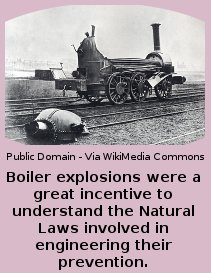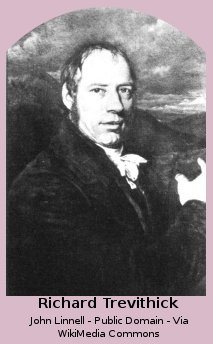Human Intelligence
Does Not Set Or Heed Boundaries
Part 20 - Part 19
Human Intelligence Masters Steam
Human intelligence does not set or heed boundaries. Establishing
risk taking limits remains the prerogative of the individual.
Determined quests to achieve genuine success demand the possession of
knowledge and comprehension. Which in turn helps one to distinguish
between safe and unsafe boundaries. Steam offered both.
Steam
Power played an equally pivotal a role in the advance of early Transport
as it did in the advance of early Industry. Everything and anything
that could move was a candidate for keen minds to Steam Power. But
before this could be attempted, the Steam Engine itself had to be
somewhat reduced in physical size.
The massive Steam Engines
powering Industrial Enterprise during that early period operated at
Atmospheric Pressure, which necessitated huge cylinder displacement to
attain adequate power outputs. Even with James Watt's major improvements.
The Answer
The answer to the obstacle of size lay in an increase in Steam Pressure. The existence of High Pressures were obvious even during the earliest investigations into Steam.
Nevertheless, the enticing phenomenon of higher pressure was so poorly comprehended that many lives were lost because of that ignorance.

Denis Papin used high pressures during the course of his many experiments with Pressure Cookers.
Notwithstanding Papin's use of a simple safety valve, Mechanical Engineering limitations during those early years could not accommodate the exponentially increasing loads that high pressures imposed on the experimenters mechanical contrivances.
Sadly, James Watt appears to be a solitary figure in his comprehending that the then state of the art of Steam Power did not yet have the resources to build mechanically sound High Pressure Engines.
Considering the ever present threat to life and limb to be too great, James Watt declined to be involved with anything higher than Atmospheric Pressure.
Boiler explosions must have been a great incentive to understand the Natural Laws involved in engineering their prevention. Yet it would seem that the age old, and still common, Belief - It won't happen to me, held precedence over knowledge and understanding.
Wisdom
When Genuine Wisdom is confronted by Intense Desire, it is not always recognized. In those rare instances where Wisdom is recognized, it is equally as rare to be acknowledged or appreciated.
In the event of pursuing High Pressure Steam Engines, an inordinate experimenters lost their lives in the disorderly scramble attempting to attain a thing without the requisite understanding.
Vindicating the insight that Wisdom reigns supreme.
James
Watt was in possession of Wisdom. He was content to devote his efforts
to developing and maintaining the integrity and efficiency of the system
already safely established. Such improvements that would underpin the
demands of the higher pressures to come.
In the meantime . . . regular Boiler Explosions were a wonderful incentive to make the effort to understand the Natural Laws involved in engineering their prevention.
Or at least should have been . . . .
Limitless Power
Thought is Intelligent Energy, that can Control and Direct, every other form of Energy, in the Universe. Thought works best, and most effectively, when used in conjunction with the above mentioned Wisdom. Albeit, doing so is much easier said, than done.
Intrepid explorers, cheerfully unaware of the above sound advice, were indiscriminately, and aggressively, pushing mechanical boundaries, making advances by learning the hard way.
Akin to boys playing games with unexploded bombs, this foolhardy approach to knowledge gathering came at a great cost to personal safety.

A cubic foot of heated water under a pressure of from 60 to 70 pounds per square inch has about the same energy as one pound of gunpowder.
So estimated American Robert H. Thurston (1839 -1903) professor of Mechanical Engineering, exuberant author on that subject, and the inaugural President of the American Society of Mechanical Engineers.
Thurston was an enthusiastic advocate of understanding
the Scientific Principles of Engineering, paying particular attention
to the properties of materials. Exemplifying the spirit of Wisdom.
Higher
pressures were enticing. It meant that Steam could now replace the
atmosphere to produce work. The boundaries of potential power achievable
appearing limitless.
Human Intelligence neither supervises nor regulates an individual's desires. But permits the individual to do so. To a Mindful person, desire is the crystal clear responsibility of the user.
Human Intelligence And Key Elements
Almost one hundred years after the debut of Thomas Newcomen's first usable Engine, Richard Trevithick (1771-1833) a British Engineer and Inventor built a higher pressure Steam Engine.

Just a few years on, this dedicated man with a resolute mind,
completed the first working Locomotive, utilizing his higher pressure
Engine.
Coincidentally, across the North Atlantic Ocean, another resolute mind, Robert Fulton (1765-1815) an American Engineer and Inventor, launched the first commercially successful steam driven Boat.
Richard Trevithick, and Robert Fulton, were not the first experimenters and discoverers in these endeavors.
There were several others.
These
two men were, however, the first to combine the necessary elements in
the correct order to make these endeavors successful.
Knowledge,
implicit in the understanding and execution of Natural Law, is the key
factor for successfully applying Human intelligence.
New Age Of Energy
The High Pressure Steam Engine was flexing its rapidly expanding muscles and a new Age of transportation was ushered in.
Richard
Trevithick's first Engines ranged from between fifty, to around one
hundred and fifty, Pounds Per Square Inch. At these pressures, with
advances in Engineering practice, Boiler explosions were not so common.
During Steam Power's glorious reign, pressures would reach ten times the
latter figure. Depending on the application.
In an example of a unique locomotive, the DRG HO2 ordered
by and delivered to the German National Railway in 1930, a pressure of
seventeen hundred and fifty pounds per square inch was employed,
producing almost two thousand kilowatts.
Knowing and understanding Natural Law rules.
Choices Need To Be Made
Steam proved effective in all modes of transportation,
with the exception of automobiles and aircraft. Although Steam
Automobiles were built and developed, and possessed definite advantages
over other fuels, such as no need for a gearbox, steam driven
automobiles were overtaken by the convenience offered by the Internal Combustion Engine.
Automobiles
suffered many drawbacks from Steam, including politically motivated
anti Steam legislation, excessively long boiler warm-up times, before
one could move, high production costs, and the ever present danger posed
by high pressure.
Human intelligence is destined to make choices.
Not Done Yet
Steam held sovereignty over Industry and Transport for more than three hundred years.

Although Steam could not fulfill the ever increasing demands for
compact, portable, self contained and instantly available and economical
power, Steam still drives the Turbines that operate the generators that
provide the major portion of the Electrical Energy we Humans consume
today.
Steam still has many applications, such as powering marine
launches. Enthusiasts are still building cars. Not to mention mops, and
other cleaners. Steam is one of the best methods of cleaning ever
harnessed.
Perhaps this hugely useful phenomenon is tranquilly satisfied. Content in the knowledge that the upstart Electricity Industry that displaced it, is, at least for the present, much reliant on it.
Steam Power changed the World, and opened up new Frontiers on the surface of our Planet.
But why stop there?
Human intelligence was looking skyward with new intent.
Human Intelligence Rocks!
Part 20 - Part 19
Next - Sky Not The Limit





